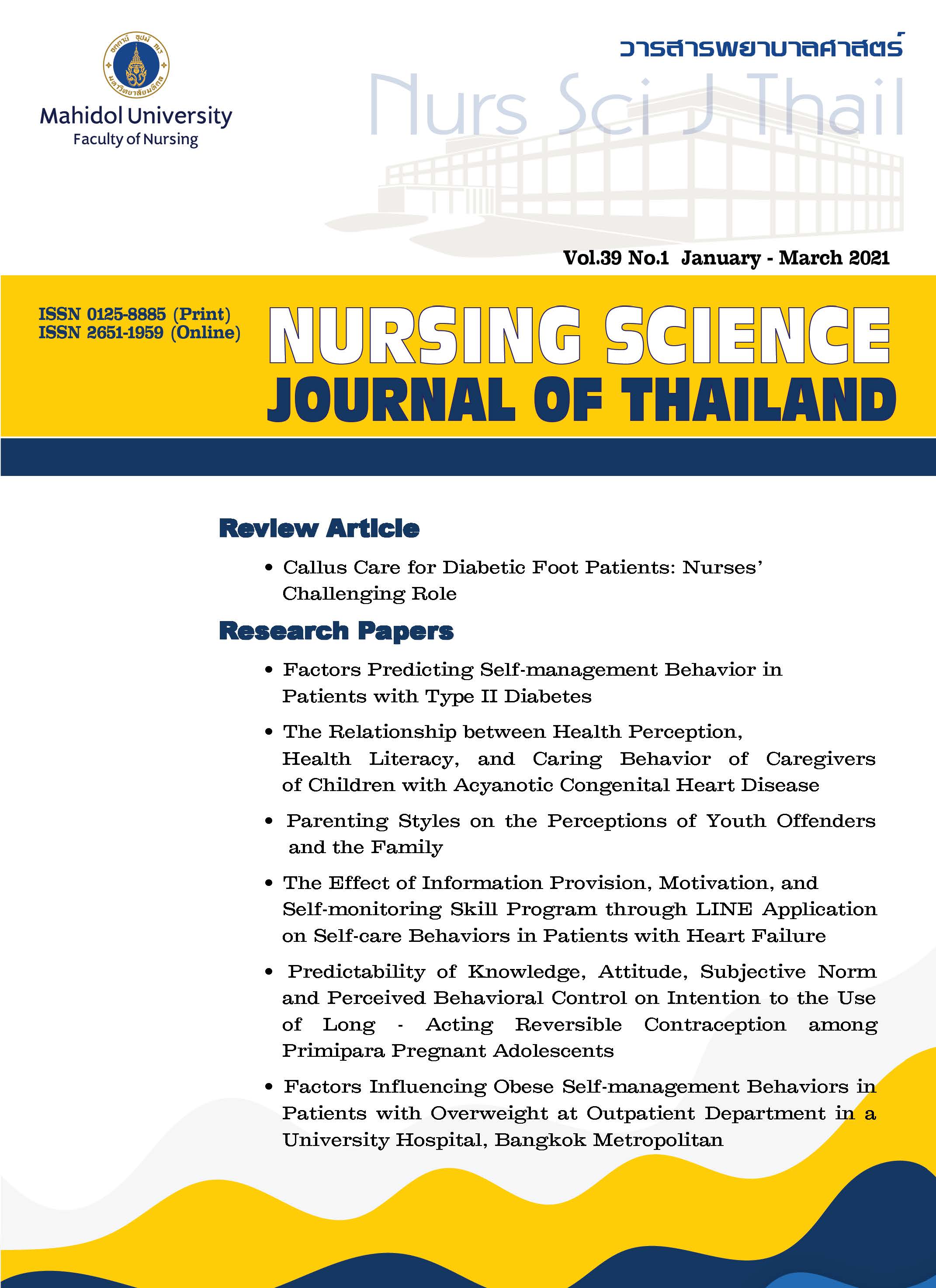Parenting Styles on the Perceptions of Youth Offenders and the Family
Main Article Content
Abstract
Purpose: To examine the parenting styles on the perceptions of youth offenders and the family and to compare the perceptions of the parenting styles between youth offenders and the family.
Design: Descriptive comparative study.
Methods: Eighty-six of youth offenders in a district prison, at Chiang Mai Province, and their families were recruited using simple random sampling without replacement. This study used a questionnaire for data collection. The data were analyzed using descriptive statistics, including frequency, percentage, mean, standard deviation, and chi-square test.
Main findings: The results revealed that authoritative parenting style was perceived most by the youth offenders (79.07%), followed by authoritarian/permissive/uninvolved parenting styles (19.77%). Consistently, the parenting style most reported by the families was authoritative (94.18%), followed by authoritarian/permissive/uninvolved parenting style (3.49%). There was a statistically significant difference between the perceptions of youth offenders and their families towards the parenting styles (p < .05).
Conclusion and recommendations: The youth offenders and their families had different perceptions towards the parenting styles. The relevant organization should find a strategy and develop a program that helps increase mutual understanding between the youth offenders and their families to strengthen their bonds and family hardiness as well as to prevent recidivism.
Article Details
Copyright Notice: Nursing Science Journal of Thailand has exclusive rights to publish and distribute the manuscript and all contents therein. Without the journal’s permission, the dissemination of the manuscript in another journal or online, and the reproduction of the manuscript for non-educational purpose are prohibited.

Disclaimer: The opinion expressed and figures provided in this journal, NSJT, are the sole responsibility of the authors. The editorial board bears no responsibility in this regard.
References
Department of Juvenile and Protection. Annual report 2014. Bangkok: Department of Juvenile and Protection, Ministry of Justice; 2015. 68 p. (in Thai).
Siricharoen D. Children and influence of family. Assumption University Law Journal. 2012;3(1):12-7. (in Thai).
National Child and Youth Development Promotion Committee. National child and youth development promotion committee act 2012-2016. Bangkok: The Agricultural Cooperative Federation of Thailand Limited; 2011. 215 p. (in Thai).
Fang Prison. Annual report 2017 [unpublished]. Chiang Mai: Fang Prison; 2017. 30 p. (in Thai).
Krejcie RV, Morgan DW. Determining sample size for research activities. Educ Psychol Meas. 1970;30(3):607-10. doi: 10.1177/001316447003000308.
Wongkongdej W. Attitudes toward help-seeking and self-regulated learning of secondary school students with different parenting styles [master’s thesis]. Bangkok: Chulalongkorn University; 2004. 209 p. (in Thai).
Decharachata D, Aksornprom A, Chatthai T. The relationships between factors causing of crimes committed and child-parenting patterns of children and youths in the juvenile observation and protection centre in Suratthani Province. Proceedings of the 4th STOU Graduate Research Conference; 2013 Nov 26-27; Nonthaburi, Thailand. (in Thai).
Sihawong S, Deedongpan S. The correlated between parenting styles and risk behaviors in adolescents. Journal of Science & Technology, Ubon Ratchathani University. 2017;19(3):165-72. (in Thai).
Sukadaecha R. A child rearing of Thai families: a systematic integrated literature reviews. Journal of Nursing Science and Health. 2020;43(1):1-9. (in Thai).
Cheinwichai P. A study of social bond and differential association factors affecting narcotic offenses of prisoners in Nakhonsithammarat Central Prison. Academic Services Journal Prince of Songkla University. 2015;26(2):61-73. doi: 10.14456/asj-psu.2015.20. (in Thai).
Savage J. The association between attachment, parental bonds and physically aggressive and violent behavior: a comprehensive review. Aggress Violent Behav. 2014;19(2):164-78. doi: 10.1016/j.avb.2014.02.004.
Kaewkeawpan W. Family relationships with problem of delinquency in adolescence. Veridian E-Journal, Silpakorn University (Humanities, Social Sciences and Arts). 2017;10(1):361-71. (in Thai).


